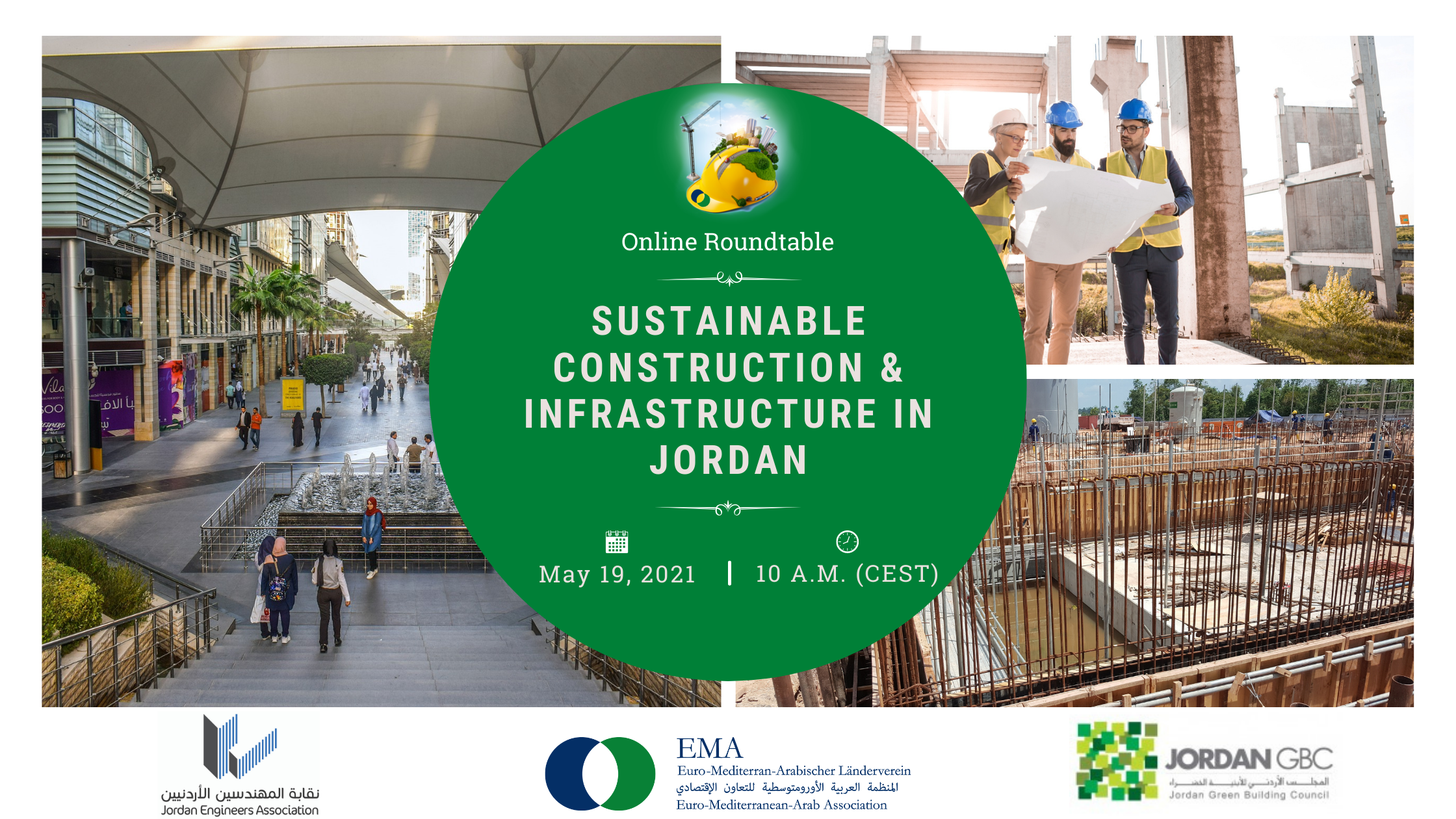In cooperation with

The Euro-Mediterranean-Arab Association EMA together with the Jordan Engineers Association and the Jordan Green Building Council cordially invites you to the following online event:
Online Roundtable
Sustainable Construction & Infrastructure in Jordan
Time: May 19, 2021, 10 A.M. – 11:30 A.M. CEST
Online (Zoom)
Language: English
Under its Vision 2025, the government of Jordan has set ambitious goals to expand construction and infrastructure in a more sustainable way. Those goals can be reached for example with building hydroelectric power stations and fostering renewable energies and therefore reducing the carbon footprint.
The Hashemite Kingdom is very determined to reduce its greenhouse gas emissions by a bulk of 14% until 2030.With this roundtable, therefore, the EMA together with the Jordan Engineers Association and the Jordan Green Building Council wants to support the rethinking of old ways and continues to support sustainable development.
Expert panelists will shed light on opportunities and best practices in the fields of green building, sustainable infrastructure, and skilled workers. The roundtable will be moderated with sufficient time for questions from the audience. In the end, there is room for an open discussion and networking.
The registration for this event has expired!
Sustainable Construction & Infrastructure in Jordan
With a population of around 10 million, Jordan offers a small but dynamic market and has a highly qualified workforce. While the Jordanian economy relies heavily on foreign investment, in return, it offers interesting business opportunities in a politically stable environment and an investor-friendly atmosphere. Investors benefit from stable exchange rates and relatively moderate inflation rates.
Growing Jordanian Construction Sector
The Corona pandemic caused only a short recession in the construction sector, whose gross domestic product in the second quarter of 2020 showed an increase to a new high of roughly 317 milion euros. The number of building and construction permits remained roughly stable at some 20,000 compared to 24,000 in 2019.
The national long-term strategy Jordan 2025 considers the construction sector as an important growth industry. It envisions GDP growth between 2018 and 2022 of 15 percent. The plan aims to establish Jordan as a hub for architecture and engineering consulting in the Mediterranean and Middle East region, especially in Iraq and the Arab Gulf countries.
Therefore, on May 19, 2021, the EMA organized an online roundtable on “Sustainable Construction & Infrastructure in Jordan” in cooperation with the Jordan Engineers Association (JEA). The expert panel with the German architect and consulting engineer and member of the EMA Ute Pfeifer (Pfeifer Interplan) and the Jordanian professor of civil engineering Dr. Bashar Tarawneh (JEA) shed light on the opportunities and best practices in the fields of green building, sustainable infrastructure, and skilled workers. The audience was especially interested in programs, obstacles, and progress in these fields and curious about incentives to foster sustainable construction in Jordan.
“Architecture…without the thought of sustainability, it has no future”
After an introduction on the significance of Jordan by EMA Head of Research & Communication Jens Kutscher, Mrs. Pfeifer presented the opportunities sustainability brings along for the construction sector from the perspective of general and individual considerations: “Architecture… without the thought of sustainability, it has no future!”
With a view to future developments, she conceded that it is not only up to the private sector, but also the government to give specific assignments and publish regulations in their joint efforts to mitigate global warming, both on a small and a big scale. Such measures, for instance, the use of wind and solar energy, thermal building insulation, and further environmentally-friendly building materials, should be considered, but also residential concepts can furthermore have a positive impact on the economic development of a country. Giving examples of a project Pfeifer Interpan was involved in in an Arab country, Mrs. Pfeifer underlined the importance of interdisciplinary cooperation with diverse partners to ensure a sustainable outcome.
Opportunities for Jordanian Engineers
In his input statement, the head of JEA’s civil engineering department and a professor at the University of Jordan, Dr. Bashar Tarawneh, presented the objectives of the JEA and the diverse divisions and branches of the organization in Jordan and abroad. Also, the requirements for working in the construction sector in Jordan were presented, for instance, the obligation on registering officially for any type of construction.
With more than 12,000 engineering offices in more than 15 countries, JEA also offers numerous professional opportunities for the private as well as public sectors through the Engineering Training Center (ETC), which offers engineering programs in and outside of universities, internships, and employment programs providing countless job opportunities. Furthermore, Dr. Tarawneh presented international business and cooperation opportunities with a focus on geographically close countries. Moreover, he highlighted measures taken to create synergies between the German and Jordanian skilled labor markets, giving examples of the German language programs with scholarships for engineers in Jordan, and the close relations to the German Federal Employment Agency to employ Jordanian engineers in German companies and the other way around. The EMA will be happy to facilitate the contact between JEA and German companies seeking to employ Jordanian engineers.
The speakers’ presentations can be accessed exclusively by EMA members here. If you are not yet a member, click here!
